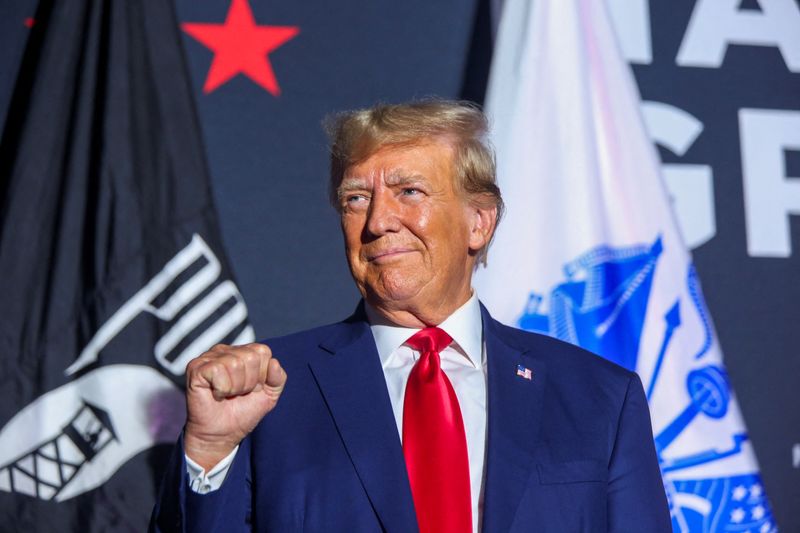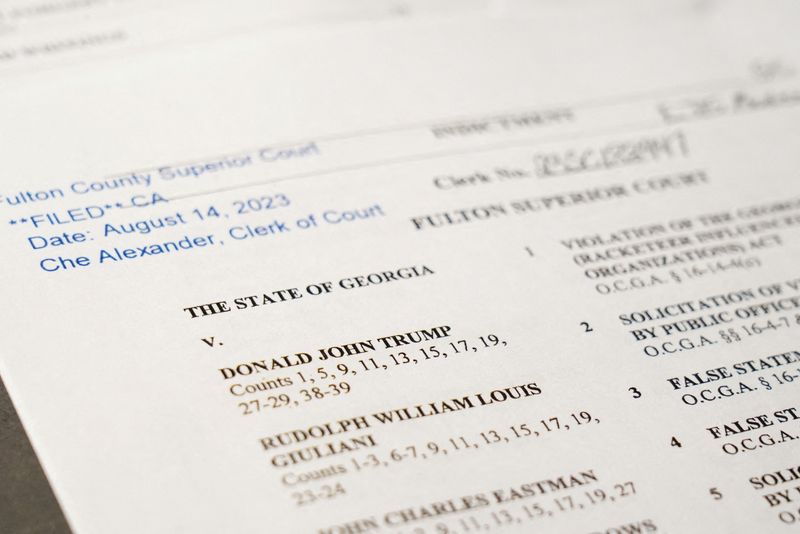By Jack Queen
(Reuters) -Donald Trump is likely to claim that his right to free speech and genuine concerns about voter fraud protect him from charges that he pressured Georgia officials to change the results of the 2020 election in his favor.
But legal experts say the case appears to be a straightforward fraud prosecution that will turn on whether Trump knowingly broke the law, regardless of whether he believed his actions were justified.
"Even if he thought he had a right to do what he did, that doesn't justify fraudulent activity," said former federal prosecutor E. Danya Perry. "If you believe money in someone else's bank account is rightfully yours, that doesn't mean you can embezzle it."
Trump, U.S. president from 2017 to 2021 and the front-runnner for the 2024 Republican presidential nomination, was indicted for a fourth time in nearly five months on Monday. Georgia state prosecutors allege he and 18 co-defendants conspired to illegally change the results of the 2020 election, which he lost to Democrat Joe Biden.
Fulton County District Attorney Fani Willis charged Trump and his co-defendants with 41 criminal counts.
Trump himself faces 13 counts including racketeering, false statements and soliciting a public servant to violate their oath.
Trump has denied wrongdoing. In a statement before the indictment was released, his campaign accused Willis of being a "rabid partisan" who was trying to undermine his reelection bid.
"It is a dangerous effort by the ruling class to suppress the choice of the people," the statement said.
Trump’s lawyers are likely to argue that his efforts to change the election results were protected speech under the First Amendment of the U.S. Constitution.
But the First Amendment does not protect fraud, and many conspiracy cases center on crimes of speech, such as extortion, bribery and solicitation.
"These are all 'word crimes,' and word crimes can be just as serious as crimes involving physical actions," said Pace University law professor and former prosecutor Bennett Gershman.
Trump may fare better arguing that he did not know he was breaking the law and thus lacked the criminal intent required for a conviction, legal experts said.
He would also need just one holdout juror to secure a mistrial.
To that end, Trump's lawyers could claim that he was charged for political reasons by Willis, an elected Democrat, and argue that her use of a racketeering law originally aimed at mafia bosses is excessive.
Defendants rarely prevail making such selective prosecution arguments, however.
Georgia's Racketeer Influenced and Corrupt Organizations, or RICO, statute is broadly written, and courts have upheld its use in a wide range of contexts, including prosecutions of teachers who falsified standardized test scores.

Trump's lawyers would need to tread lightly if they refer to his conspiracy theories to make their case, legal experts said, because making false claims in court can have serious consequences.
"Lawyers have to be very careful, because if the arguments they make are not based on evidence, they can be sanctioned," Gershman said. "Many of the lawyers who made wild allegations in court after the 2020 election were disciplined because they had no proof."
